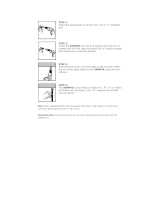
5
1
1
WARNING
Briggs & Stratton does not approve or autho-
rize the use of these engines on 3-wheel All
Terrain Vehicles (ATV’s), motor bikes, fun/rec-
reational go-karts, aircraft products, or vehi-
cles intended for use in competitive events.
Use of these engines in such applications
could result in property damage, serious injury
(including paralysis), or even death.
WARNING
The engine exhaust from this product contains
chemicals known the State of California to
cause cancer, birth defects, and other repro-
ductive harm.
WARNING
Gasoline and its vapors are extremely
flammable and explosive.
Fire or explosion can cause severe
burns or death.
When adding fuel:
• Turn engine OFF and let engine cool for at least 2 minutes
before removing the fuel cap.
• Fill fuel tank outdoors or in a well-ventilated area.
• Do not overfill fuel tank. To allow for expansion of the gaso-
line, do not fill above the bottom of the fuel tank neck.
• Keep gasoline away from sparks, open flames, pilot lights,
heat and other ignition sources.
• Check fuel lines, tank, cap, and fittings frequently for cracks
or leaks. Replace if necessary.
• If fuel spills, wait until it evaporates before starting engine.
When starting engine:
• Make sure spark plug, muffler, fuel cap, and air cleaner are
in place.
• Do not crank engine with spark plug removed.
• If fuel spills, wait until it evaporates before starting engine.
• If engine floods, set choke (if equipped) to OPEN/RUN posi-
tion. Place throttle (if equipped) in FAST and crank until
engine starts.
When operating equipment:
• Do not tip engine or equipment at an angle which would
cause fuel to spill.
• Do not choke carburetor to stop engine.
• Never start or run the engine with the air cleaner assembly
(if equipped) or the air filter (if equipped) removed.
When changing oil:
• If you drain the oil from the top oil fill tube, the fuel tank must
be empty or fuel can leak out and result in a fire or explosion.
When transporting equipment:
• Transport with fuel tank empty or with fuel shut-off valve set
to OFF.
When storing gasoline or equipment with fuel in the tank:
• Store away from furnaces, stoves, water heaters, or other
appliances that have a pilot light or other ignition source
because they can ignite gasoline vapors.
WARNING
Running engines produce heat. Engine
parts, especially mufflers, become
extremely hot.
Severe thermal burns can occur on
contact.
Combustible debris, such as leaves,
grass, brush, etc. can catch fire.
• Allow muffler, engine cylinder fins, and radiator
to cool before touching.
• Remove accumulated debris from muffler area
and cylinder fins.
• It is a violation of California Public Resource
Code, Section 4442, to use or operate the
engine on any forest-covered, brush-covered,
or grass-covered land unless the exhaust sys-
tem is equipped with a spark arrester, as
defined in Section 4442, maintained in effective
working order. Other States and Federal juris-
dictions may have similar laws. Contact the
original equipment manufacturer, retailer, or
dealer to obtain a spark arrester designed for
the exhaust system installed on this engine.
WARNING
Unintentional sparking can result in fire
or electrical shock.
Unintentional start-up can result in
entanglement, traumatic amputation, or
severe lacerations.
Before performing adjustments or repairs:
• Disconnect spark plug wire and keep it away
from spark plug.
• Disconnect the negative (-) battery terminal.
When testing for spark:
• Use approved spark plug tester.
• Do not check for spark with spark plug
removed.
WARNING
Engines give off carbon monoxide, an
odorless, colorless, poison gas.
Breathing carbon monoxide can cause
nausea, fainting, or death.
• Start and run engine outdoors.
• Do not start or run engine in an enclosed area,
even if doors and windows are open.




















